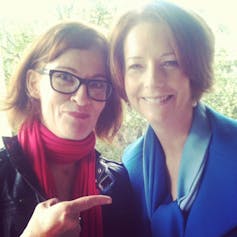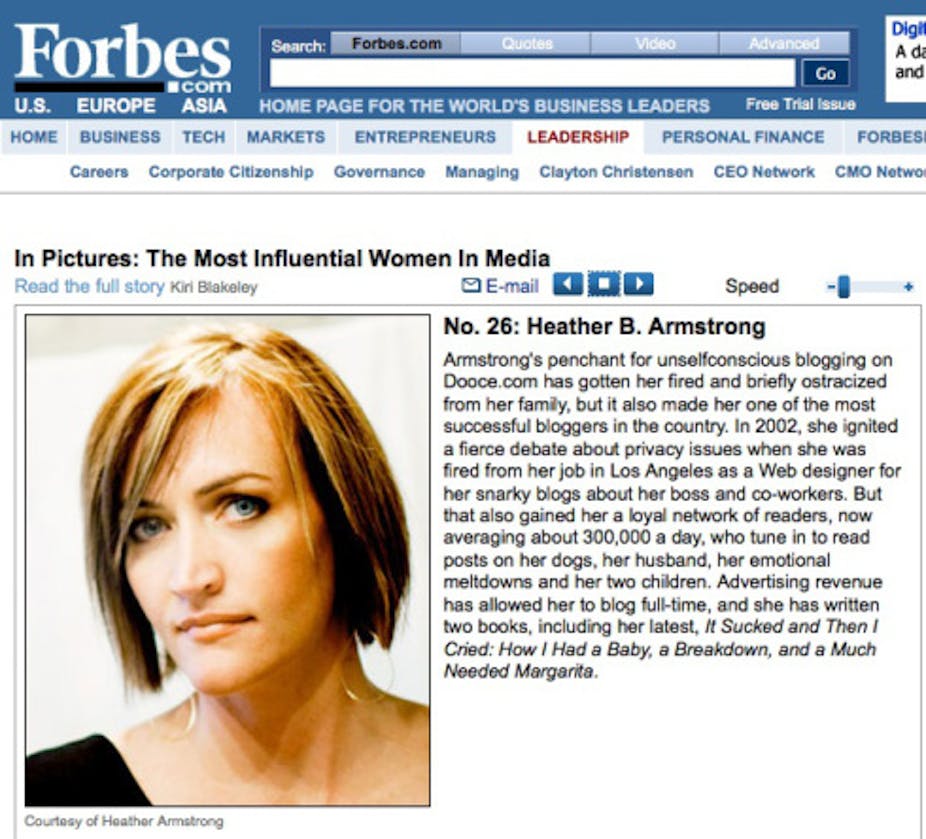Making the personal political has long been a feminist project. But parenting blogs — known popularly, but often with a special sort of sexist sneer as “mummy blogs” — increasingly run the risk of making the personal commercial.
In America, popular blogs average 100,000 hits or more a day. Some bloggers reportedly make as much as US$1 million a year from sponsored posts and advertising.
In Australia, where blogging has exploded only in the last few years, the leading blogs can average up to 60,000 hits a month. Advertorials, giveaways and product reviews are turning a few of them into money-earning enterprises.
A burgeoning industry is being generated entirely out of everyday encounters with breast pumps and baby sick, broken washing machines, stroppy dogs, and the pros and cons of cloth nappies.
It is facile to argue that parenting blogs – monetised or not – are either liberating or limiting for women. Online conversations work in significantly different ways to in-person conversations, but they often reflect existing power relations. They have a similar capacity to sustain or shake the status quo, to rework or re-entrench existing myths.
Bypassing media myths
Even in our age of increased gender equality, it often seems as if the media love nothing more than to dish out the myths about how to be a better mother (or a thinner, more fashionable, or better-looking mother).
It’s not just the celebrity mummies pushing their prams on magazine covers, or the continuing dearth of women on television who are less than exceptionally good-looking, or that mothers in advertising are ubiquitously obsessed with cleaning products and alpine-fresh scents. Television dramas have pleasingly increased the handful of roles featuring working mothers, but the majority of them are unduly punished in the twists of the melodramatic plot.
TV’s working mothers have wimpy husbands, or damaged children, and bad characters are invariably bad due to the shortcomings of their mothers. Serial killers, for example, have over-bearing mothers or alcoholic mothers, or never really separated from their mothers.
What parenting blogs give readers is the messy experience inbetween. I personally find it comforting to be told you aren’t crazy (you are sleep-deprived); that it’s fine if you occasionally want to run screaming from the house (just make sure you come back); and that if motherhood doesn’t fill you with maternal bliss every minute of every day, that’s also okay. You’re not a failed mother, or a bad mother, you’re simply normal.
One of Australia’s better-known bloggers, Eden Riley, offers a healthy dose of lived experience, writing candidly about her “ridiculous childhood, being a mother, a stepmother, a recovering alcoholic and drug addict”. Riley, who wields the kind of clout that got her an interview with former prime minister Julia Gillard, says:
We live in such an airbrushed, politically correct and ‘safe’ world. I’m completely comfortable writing on the Internet about the dark side to life. People respond fiercely. So I make an effort to keep pushing myself and my boundaries, asking questions and punching the world.

Also taking a axe to the motherhood myth, the beauty myth and the fashion myth is Danimezza, a self-described “116kgs, 170cm, size 20” glossy magazine addict. Her anarchic photographic explorations of “seriously curvy fashion” once scored her a spread in Italian Vogue — pictured with the words “F*ck Flattering” emblazoned on her t-shirt.
Daddy bloggers are also a growing presence on the internet. The popularity of stay-at-home dad blogs like Reservoir Dad is surging. Reservoir Dad says:
In the past, I feared becoming one of the world’s commonalities – a 40-ish Dad, living in a suburban home, with wife and kids, waking up, eating Doritos, falling asleep.
Now he writes about his “children’s birthdays, my fears for them, the joy they fill me with” — in between promoting Skylanders for Wii and other items.
The rise of a blogging industry
In Australia, the industrial aspects of blogging go largely unscrutinised. Some bloggers go to great lengths to disclose promotional content, but others are less forthcoming. It is left to the cynical reader to suspect there may be an element of convenience in reports that your child has an ongoing obsession with a brand-name toy that you are being paid to promote.
This, for example, is the disclosure statement found at Baby Mac:
This blog accepts forms of cash advertising, sponsorship, paid insertions or other forms of compensation. The compensation received may influence the advertising content, topics or posts made in this blog. That content, advertising space or post may not always be identified as paid or sponsored content.
Parenting blogs are attractive to brands looking to invest their products with an aura of “authentic experience”, especially as audiences become increasingly cynical about advertising in other media. Products are inserted into genuine parents’ conversations — that is, within relationships that are meaningful to people — and those conversations can be manipulated to sell products back to parents.
The presence of marketing in mothers’ conversations is already having an impact on the kinds of conversations being had, so this blogging phenomenon may not be as liberating as it seems.

